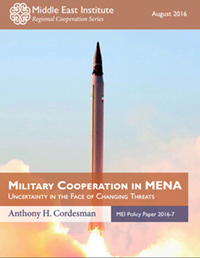Regional Cooperation Series
This Policy Paper is part of The Middle East Institute's Regional Cooperation Series. Throughout 2016, MEI will be releasing several policy papers by renowned scholars and experts exploring possibilities to foster regional cooperation across an array of sectors. The purpose is to highlight the myriad benefits and opportunities associated with regional cooperation, and the high costs of the continued business-as-usual model of competition and intense rivalry.
Summary
It is all too easy to develop ambitious plans for regional security cooperation. In practice, however, almost all real world security cooperation is dependent on the different priorities states give to various threats, the willingness of given regimes to act, the resources they develop and have available, and the level of interoperability between their forces. Actual security cooperation in the MENA region has long been limited, occurred between changing mixes of individual countries rather than on a regional basis, and always lagged behind the rhetoric. Better cooperation on this level could evolve in the face of forces such as Iran’s military efforts, a powerful new Islamist extremist threat, or the outcomes to the fighting in Libya, Iraq, Syria, and Yemen. However, there is little reason to assume, given regional trends, that the prospects for regional cooperation or cooperation between states will improve in the near future, and bilateral relations with external powers, principally the United States, are likely to continue to play a more critical role in the future.
Key Findings
- The most important aspects of real world security cooperation in the MENA region today are driven by different coalitions of states from inside and outside the region fighting on different sides of the conflicts in Syria, Iraq, and Yemen
- The G.C.C. is the only alliance with a functional security role that is not driven by a given conflict, and it remains a relatively weak structure with important divisions between its members
- A truly moderate regime in Iran could dramatically change the nature of regional security cooperation, as could the emergence of a new, ISIS-like threat of a takeover in a state or region
- The United States is the most important single force for security cooperation in the region, although Turkey and Russia are emerging as increasingly important players
Read the full Policy Paper here.
The Middle East Institute (MEI) is an independent, non-partisan, non-for-profit, educational organization. It does not engage in advocacy and its scholars’ opinions are their own. MEI welcomes financial donations, but retains sole editorial control over its work and its publications reflect only the authors’ views. For a listing of MEI donors, please click here.













